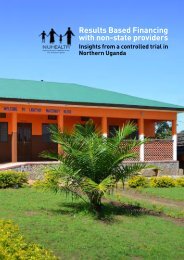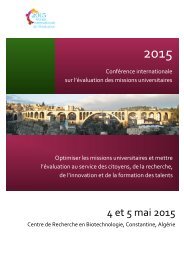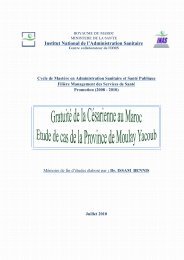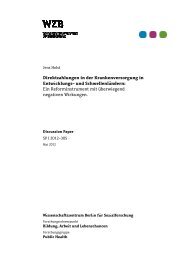Bellagio-Report-Vs-Apr-14
Bellagio-Report-Vs-Apr-14
Bellagio-Report-Vs-Apr-14
Create successful ePaper yourself
Turn your PDF publications into a flip-book with our unique Google optimized e-Paper software.
Surveys (DHS). On these too, not enoughattention is paid to data analysis, dissemination ofreports of findings and further research into thefindings and recommendations of the surveys.Also even though administrative data mostlyoriginates in communities, through villages anddistricts, linkages between these levels and thenation levels including feedback to the grass rootis weak.Moreover, studies have shown that generally atnational levels throughout the Continent, theEvaluation research function including itstechnical capacities is weak. Specifically,Evaluation in government reporting systems isunder- utilized and its institutionalization isgenerally weak. This includes the awareness of itsimportance in development efficiency andeffectiveness.These may be attributed to weak nationalcapacities including the practice and culture ofEvaluation. For instance, an evaluation capacityassessment by AfrEA prepared in 2007, revised in2009 10 , and recently the case studies on the stateof evaluation prepared by CLEAR, underscoredthe gap in Monitoring and Evaluation educationand research at African universities. People arenot trained within the African context andindigenous knowledge. The few Africanuniversities offering training, they were in theform of generic modules in Evaluation as part of adegree program. The modules have not evolvedto reflect the African context; as well asindigenous knowledge on data collection;analysis and dissemination which are crucial forthe relevance and effectiveness of the training forthe continent. As a result the trainees arequalifying without necessarily adopting theappropriate skills to undertake contextuallyrelevant evaluation and be fully effectivemembers of the African evaluation community.Hence, the current state of evaluation theory andpractice is not influencing African development.There is also a gap in many countries not havingvibrant National Professional EvaluationAssociation. The current hypothetical status ofNational Associations in the continent being that:few exist and where there are mostly weak,dormant and none-existence.THE PROCESS OF EVALUATION INAFRICATechnical and Financial Partners (TFP) made atone time to another, a valuable contribution tothe promotion of evaluation in Africa on the onehand by requiring that M & E should be takeninto account in the implementation of theirsupport (projects and programs) and on the otherhand by playing an important role in theemergence of an active civil society in evaluationboth at the national level (national associationsand networks) which also include the creation ofAfrEA as a continental body.The support of the donor community (bilateraland multilateral) were made in various forms andvaried. They concerned national actors, bothstate and non-state actors to enable them to:• Appropriate tools for M & E,• Contribute to the consolidation ofachievements• And participate in the process ofinstitutionalization of the evaluation.TOWARD THE INSTITUTIONALIZATIONOF EVALUATION IN AFRICA: THE ROLEOF AFREAThe trend towards the institutionalization ofevaluation has been seen as a formalizationprocess based on lessons learned from practice,confirming the perception of Frederick VARONEand Steve Jacob, when they write that "the terminstitutionalization covers (a sociological point ofview) a formal organization or a procedural rulewhich provides stakeholders with a framework toensure predictability of their reciprocal behaviorand, therefore, the result of the collective action.Institutionalization is therefore a "routinization" ofthe action - expected if not required - to assessand can be measured in terms of its actualpractice in the politico - administrative andwider, networks of public action. " 11The evolution of evaluation in African states doesnot affect fundamentally the path describedabove. However, each country where thepolitical powers maintain most of the process10The updated Development Capacities in Evaluation inAfrica, 2009, was conducted by Francois Corneille, IssakaTraire and Nene Konate.11 Frédéric VARONE et Steve JACOB « Institutionnalisationde l’évaluation et Nouvelle Gestion ¨Publique : un état deslieux comparatif » – Revue internationale de PolitiqueComparée, Vol. 1, n° 2, 2004, page 274.African Thought Leaders Forum on Evaluation and Development, <strong>Bellagio</strong>, Nov 2012 40








